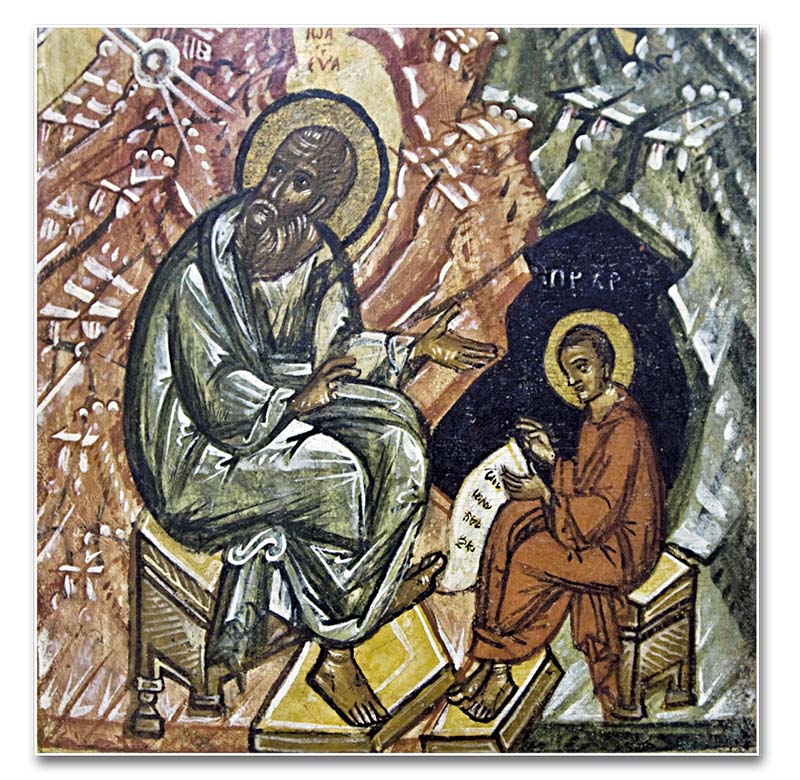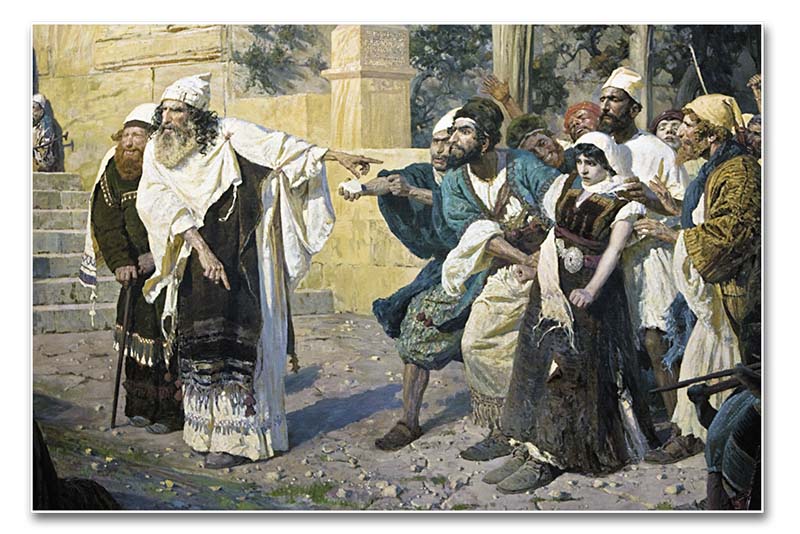Whoever does not correct his neighbour, not only harms him, but also harms himself. He will be deprived of the merits and benefits of the fulfilment of this duty, and will eventually cause scandal to those who come to know of his negligence
Gospel 23rd Sunday in Ordinary Time
Jesus said to His disciples: 15 “If your brother sins against you, go and tell him his fault between you and him alone. If he listens to you, you have won over your brother. 16 If he does not listen, take one or two others along with you, so that ‘every fact may be established on the testimony of two or three witnesses.’ 17 If he refuses to listen to them, tell the Church. If he refuses to listen even to the Church, then treat him as you would a Gentile or a tax collector. 18 Amen, I say to you, whatever you bind on earth shall be bound in Heaven, and whatever you loose on earth shall be loosed in Heaven. 19 Again, amen, I say to you, if two of you agree on earth about anything for which they are to pray, it shall be granted to them by My heavenly Father. 20 For where two or three are gathered together in My name, there am I in the midst of them” (Mt 18:15-20).
I – Correction, the Great Means of Salvation
St. Alphonsus Maria de Liguori is the author of a beautiful work entitled Prayer, the Great Means of Salvation. Its content is both irrefutable and of inestimable value. In it, the Saint affirms that “he who prays is certainly saved; he who does not is certainly damned.”1
We reach a similar conclusion by penetrating into the heart of the Gospel for this 23rd Sunday in Ordinary Time: fraternal correction is a great means of salvation, since the eternal destiny of a person may depend on his acceptance of corrections received.
Today’s Liturgy invites us to consider the duty of fraternal correction and the necessity of taking it to heart.
II – What Son Is There whom His Father Does Not Discipline?
“Jesus said to His disciples: 15 “If your brother sins against you, go and tell him his fault between you and him alone. If he listens to you, you have won over your brother.”
The counsel of the Divine Master on the need to correct those who sin against us is clear.
Regarding personal offences, insults or even the defects we observe in the conduct of others – above all those concerning Faith and customs, which can give rise to scandal – we must not neglect to admonish our neighbour out of indifference, or worse yet, out of contempt. And to practise the maxim expressed by Our Lord in the above verse, our zeal should be filled with fervour.
With warmth of feeling, St. John Climacus2 compares the cruelty of a person who snatches bread from the hands of a hungry child with one who has the obligation to admonish yet fails to do so. The latter harms not only his neighbour, but also himself. By this omission he is deprived of the merits and benefits which the fulfilment of this duty brings, and he moreover scandalizes those who witness his negligence.
A parallel can be drawn in horticulture. The more fertile the terrain, the more cultivation it requires to keep it from turning into a thicket, and later, a forest.
Obviously, in applying this precept, one must not act with passion, however trifling. The absence of agitation is fundamental. Utmost charity should be practised in the very delicate task of reconciliation.
The obligation to admonish
The first responsibility – recognition of the error itself – falls to the one who committed it, but zeal, prudence, and love of God rest with the person obliged to admonish. “He who spares the rod hates his son, but he who loves him is diligent to discipline him” (Prv 13:24).
It is false kindness, therefore, to refrain from making a necessary correction, judging that by acting thus, the one needing it will be spared some grief. To be guilty of this omission, in reality, is not only to conspire with the error, but also shows a lack of charity toward the one needing help through an enlightening word. This sentimentality, imbalance, and misplaced tolerance only confirms wrongdoers in their vices.
It is of utmost importance for parents, educators, etc., to fulfil their duty in this regard, as the Book of Proverbs teaches us: “Folly is bound up in the heart of a child, but the rod of discipline drives it far from him” (22:15). It is, moreover, a sign of great love to admonish subordinates for their faults; in acting thus with his child, a father shows that he desires for him all good and virtue.
The one receiving the admonishment or reprimand should reciprocate this love: “My child, do not despise the Lord’s discipline or be weary of His reproof, for the Lord reproves the one whom He loves, as a father the son in whom he delights” (Prv 3:11-12).
If a superior neglects to admonish those under his care, it is a clear sign that he does not feel loved as a father; or that he does not love the subordinate as a son, and, in this latter case, will not uncommonly murmur against him. In writing to the Hebrews, St. Paul unhesitatingly affirms: “It is for discipline that you have to endure. God is treating you as sons; for what son is there whom his father does not discipline? If you are left without discipline, in which all have participated, then you are illegitimate children and not sons” (Heb 12:7-8). For remorse, sorrow for our faults, and the weight of the conscience are a priceless gift from God.

“Do not withhold discipline from a child”
Cornelius a Lapide, in his famous commentaries on Sacred Scripture, has the following to say on these verses of the Book of Proverbs: “Do not withhold discipline from a child; if you beat him with a rod, he will not die. If you beat him with the rod you will save his life from Sheol” (23:13-14): “Parents who are excessively indulgent with their children do not chastise them, but expose them to the tortures of hell. Whoever shows excessive indulgence toward their children is their cruellest enemy. Therefore, fathers and mothers, if you love your children, apply the rod of correction, so that they may not end up in hell; if you spare them the former, you will be condemning them to the latter. The choice is yours!
“We repeat: the salvation and happiness of children is the consequence of a good education and the righteous severity of the parents. On the contrary, a permissive complacency and a lack of admonishment are the foundation for evil conduct and the condemnation of the children: they fall into excesses and crimes that lead them to eternal disgrace. How many children, in hell, curse their parents and hurl imprecations against them for all eternity for having neglected to reproach, correct, and punish them, thus becoming the cause of their eternal perdition!
“The hatred of these wretches is understandable, since their parents gave them not life, but death; not Heaven, but hell; not happiness, but eternal and immeasurable misery. The child keeps the habits of his childhood and adolescence until old age and death, in accordance with the words of Sacred Scripture: ‘Train up a child in the way he should go, and when he is old he will not depart from it.’”3 Indeed, a tree that is bent at an early stage will continue to be crooked until it is cut down and thrown into the fire.
Duty of gratitude of those who are corrected
In daily life, we sometimes leave home in a rush, unaware of a defect in our appearance: mismatched socks, a maladjusted piece of clothing, etc. If someone kindly points this out to us, we promptly show our appreciation; on the other hand, if no one tells us, we feel resentment. How much more grateful we should be to those who admonish us for our lack of virtue, most especially when this could be a source of scandal.
Even the observations of those on the paths of paganism illustrate that the very dictates of human wisdom agree in this matter. Plutarch4 affirms that we should be grateful to our adversaries for speaking the truth about us. Friends, he states, only know how to flatter, praise, and fawn over us. We find this today, also, in our common dealings: we only encounter correction when hostility has been established – only then do we know what others really think of us.
Hugh of St. Victor5 wisely sums up the beneficial effects of correction. When accepted with humility and gratitude, it checks evil desires, bridles the passions of the flesh, overcomes pride, diminishes intemperance, combats superficiality, and represses evil inclinations of the mind and heart. This is why we gain a brother when the one we have corrected accepts it well. For we restore his peace of soul and set him back on the path of salvation.
III – Amicable Correction Before Witnesses
16 “If he does not listen, take one or two others along with you, so that ‘every fact may be established on the testimony of two or three witnesses.’”
The desire to save our brother should be imbued with great zeal. If our private admonition to him has been fruitless, we should not abandon him; on the contrary, we must insist.

The instruction given here by the Divine Master is not aimed at fulfilling the requirements demanded by Deuteronomy: “On the evidence of two witnesses or of three witnesses he that is to die shall be put to death; a person shall not be put to death on the evidence of one witness. […] Then both parties to the dispute shall appear before the Lord, before the priests and the judges who are in office in those days” (17:6; 19:17). It is, rather, intended to employ the instinct of sociability as a powerful tool of psychological pressure to try to “gain a brother.”
By remaining within a restricted circle, the social reputation of the culprit is still safeguarded. However, the presence of witnesses can create a certain healthy fear, and sometimes makes it impossible for him to deny his guilt. If he does indeed acknowledge it, the desired effect of the first attempt, expressed in the previous verse, is achieved.
The efficacy of this method depends on the value which the transgressor gives to the reputation he holds among the others. It is not a matter of placing him legally between the sword and the wall, so to speak. This would be more likely to awaken an irreversible hatred in him, rather than leading him to feel remorse for his fault. The others involved should not act as witnesses in court, but rather as contributors in friendly admonition. In this way, the transgressor’s reputation and dignity is treated with utmost care.
“What should be done, if he does not respond to correction, and continues in his sin? ‘Take one or two others along with you, so that every fact may be established on the testimony of two or three witnesses.’ For the more shameless and insolent he shows himself to be, the more diligent should be our application of the remedy, without, however, moving him to rage and hatred. In seeing that the disease does not abate, the physician does not slacken, but rather redoubles his curative efforts. This is what the Lord commands us to do here. Since your word alone has proven too weak, reinforce your strength by taking others with you. Truly, with two you have enough to reprehend or correct a sinner. Observe how the Lord does not only see to the interests of the offended, but also to those of the offender. For, in fact, the one who is compromised is the one who allowed his passions to dominate him. It is he who is ill, who is debilitated, and who is suffering. This is why the Lord commands the offended party to visit him: first alone, then with others; and if he continues obstinate, then with the whole Church.”6
According to St. Jerome, it can also be understood in this way: “If he will not hear you, take along one brother; if he yet will not hear you, take a third, for the purpose of correcting him before witnesses.”7 To this commentary should be added that of the Gloss: “Or, so that if he affirm that he has not sinned, the witnesses prove his sin.”8
IV – The Good of the Church
17 “If he refuses to listen to them, tell the Church. If he refuses to listen even to the Church, then treat him as you would a Gentile or a tax collector.
At this point, it has become obvious that the amicable method has failed; the guilty party has persisted in his hatred, defects, or errors. In this case, recourse is found solely in the Church, the institution which Our Lord Jesus Christ promised would be founded upon the rock called Peter. Although the focus remains on zeal for the soul of the perpetrator and for his well-being, another good also surfaces: that of the Spouse of Christ.
He will no longer belong to the flock
If he fails to listen to the voice of the Church, he should be considered as a Gentile or a tax collector. It will be indispensable to sever all relations. No tie will link us to him. He will be excluded, just as the Gentiles or tax collectors, whom the Jews prohibited from participating in worship and prayers. All will consider him a pernicious person who could place the perseverance of others at risk; hence the necessity of avoiding all social contact with him.
Pitiable is the person who fails to heed the voice of the Church or who despises its tone and sonority. He may rise up against its authority, debate its duties, or despise its corrections or condemnations. Nevertheless, the word of the Lord is as solid as a rock: “Heaven and earth will pass away, but My words will not pass away” (Mt 24:35). Such a person will no longer belong to the flock of the Good Shepherd; he will no longer have the right to be called Catholic, Apostolic, and Roman… Whoever turns his back on the Church of Jesus Christ will be considered a Gentile or tax collector in the eyes of God.
This denunciation should be made with a Christian spirit. This is how the servants acted in the parable, when, with heavy hearts, they reported the fault of their companion to their lord (cf. Mt 18:31). Had the accusers been motivated by a spirit of hatred or vengeance – purely through egoism or envy, they would have been considered detestable informants; but, as it was, they could not be seen as vile or malicious.
God commands that we reprove and turn away
When a Catholic makes an accusation, he does so out of love and with love. Realizing that the sinner can eventually become a danger to the common good, and therefore, to society itself, failure to denounce him would be an omission against charity, or even egoistical and cowardly complacency. The vice of this omission is practised even within some religious communities. It is an omission which eventually turns into gossip and often leads to the disclosure among community members, of the infractions of one or another transgressor. These murmurings at times surpass the limits of calumny.

This lack of charity has noxious consequences on the transgressor himself, who would greatly benefit if he were known as such. Being repudiated by those close to him could augment his sense of shame and serve as a beneficial means of conversion, as St. Jerome teaches: “If yet he will not hear them, then it must be told to many, that he may be held in abhorrence; so that he who could not be saved by his own sense of shame, may at least be saved by public disgrace.”9
Therefore, it is a duty to denounce the sinner, as the Gloss emphasizes: “Or, tell it to the whole Church, that his shame may be the greater. After all these things follows excommunication, which ought to be inflicted by the mouth of the Church, that is, by the priest, and when he excommunicates, the whole Church works with him.”10
The Latin maxim also applies here: corruptio optimi, pessima — the corruption of the best is the worst. We see how much more pernicious, at times, is a Christian who embarks on the evil path, than the wicked themselves, as St. Jerome asserts: “By the words, ‘As a pagan and a publican,’ it is shown that it is more detestable for a believer to practise the deeds of an unbeliever, than those who are openly Gentiles. Those He calls publicans, in a figurative sense, those who pursue worldly gain, and levy taxes by way of trafficking, fraud, thefts, and perjuries.”11
Indeed, as St. John Chrysostom underscores: “Yet [the Lord] enjoins nothing of this sort to be observed towards those who are outside [the Church]. Of these He says, ‘If any one strikes you on the right cheek, turn to him the other also’ (Mt 5:39); as Paul says: ‘For what have I to do to with judging outsiders?’ (1 Cor 5:12). But brethren he bids us reprove, and turn away from.”12
Virtue on the part of accuser and accused
It is not an overstatement to insist, that not just the keynote, but the very heart of this denunciation should be love of neighbour for the love of God, since whoever becomes angry with his neighbour will be the criminal before the tribunal of God (cf. Mt 5:22). Egoistic and harmful indignation, sarcasm, mockery, vengeance, and the like must not be given entry to even the hidden recesses of our heart, for God is there to examine our sentiments and intentions. They are the font of our actions, and hence, all rancour should be intransigently wiped out.
Of the accused, virtue is also demanded for his conversion, since the same pride that led him along the wrong path will be no small obstacle for him to overcome. “Where is there to be found a man who desires to be reprimanded? And where is that wise man, of whom Solomon speaks in Proverbs: ‘Reprove a wise man, and he will love you? (Prv 9:8).’”13 The expression of repentance and amendment of the admonished is greeted with a beautiful exclamation from Sirach (cf. Sir 20:3), affirming that by this means one will more easily flee from sin. St. Basil,14 too, makes an analogy between the willingness of a patient who accepts the painful treatments prescribed by the doctor for his cure, and the humility of a man who truly desires his eternal salvation, since he joyfully accepts the admonishment rendered, as bitter and severe as it may be.
To take reprimands wrongly is not only an offence to God, but even leads to the rejection of all likeness with Our Lord Jesus Christ. Whoever acts like this will soon lose all his virtues, and out of pride, will go from one fall to the next, with each step drawing him closer to the spirit of satan.

The power given to Peter
18 “Amen, I say to you, whatever you bind on earth shall be bound in Heaven, and whatever you loose on earth shall be loosed in Heaven.”
We should joyfully show our gratitude for this power given by the Redeemer to the first Pastors of the Church, and, in their person, extended to all their successors.
It is a most noble, lofty, ample and necessary power for the perpetuity of the deposit of Faith, the conservation of good customs and tradition—in short, for good order. It was granted to Peter in its plenitude (cf. Mt 16:18-19) and it is by virtue of his authority that the others have it. “These immense powers which embrace both without as well as within – that is, the right to pronounce legal judgements and absolve sins – are not confided, as is natural, to the great mass of the faithful, but to the rightly instituted superiors. And if the formula by which it is conferred upon them is similar to that which Jesus used when He designated St. Peter supreme head of the Church, it is also natural that they are but granted a jurisdiction subordinate to the authority of the Supreme Pastor.”15
Origen makes an interesting observation on the use of Heaven in the plural: “the heavens,” by Jesus in referring to the powers given to Peter, and the singular when addressing the Apostles: in Heaven, “for this power is not as perfect as that given to Peter.”16
St. Jerome makes a striking assessment of this passage: “Because He had said, ‘If he refuses to listen even to the Church, let him be to you as a Gentile and a tax collector’ (Mt 18:17), whereupon the brother so who thus spurned [the correction] might answer, or think within himself, ‘If you despise me, I also despise you; if you condemn me, I also condemn you.’ [The Lord] therefore confers powers upon the Apostles, that they may be assured that when any are condemned in this manner, the human sentence [that given by the faithful] is ratified by the sentence of God. ‘Verily I say unto you, whatsoever you shall bind on earth shall be bound in Heaven.’”17

It is also fitting to cite the wise reflections of St. John Chrysostom: “And He did not say to the ruler of the Church, ‘Bind those who sin,’ but ‘If you bind,’ leaving the whole matter to the offended party. And the bonds remain indissoluble. Therefore the sinner will suffer the utmost ill, and the one who brought him to account is not to blame, but rather the one who was unwilling to submit. See how the Lord condemns the sinner to a double requirement: punishment here on earth and another in the afterlife. But if He threatens with a punishment on earth, it is so that the future suffering might be averted, that he may become meek through fear of being cast out of the Church, and fear that this bond on earth will also be bound in Heaven. And knowing this, it is natural that man – if not at the beginning, at least in passing through successive tribunals – leave off his anger. Wherefore, I tell you, He has established a first, and a second, and a third court, so that though he should neglect to hear the first, he may yield to the second; and even if he should reject that, there will yet be a third. And though he should still make no account of this, he may be dismayed at the vengeance to come, and at the sentence and judgement to proceed from God.”18
V – Humanity Will Always Need Forgiveness
19 “Again, amen, I say to you, if two of you agree on earth about anything for which they are to pray, it shall be granted to them by My heavenly Father. 20 For where two or three are gathered together in My name, there am I in the midst of them.”
It can be unhesitatingly affirmed that the synthesis of the entire work of the Saviour is found in these two vers es. Jesus is the link binding all who resolve to gather inHis name, since under these conditions, He will be in their midst. Through His intercession, the mercy of the Father will be obtained and the disciples will know what to request, since the Spirit intercedes within them (cf. Rom 8:26). Jesus will be acting upon each one, offering them His love, power, and wisdom. This is the true Church which lives from compassion, mercy and piety, since humanity, which will always sin, stands ever in need of forgiveness from the Divine Redeemer, given through His Church. ◊
Notes







